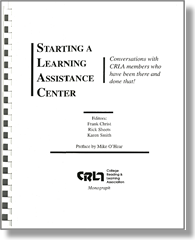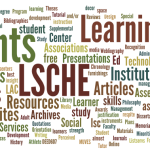Conversations with CRLA members who have been there and done that

College Reading & Learning Association Monograph
Editors: Frank Christ, Rick Sheets, Karen Smith
Preface by Mike O’Hear, 1998-99 CRLA President
A special thanks to CRLA and H&H Publishing for their extra efforts in providing this work to colleagues at near cost for more than a decade. We acknowledge their continued dedication to supporting learning assistance and student success and want to let them know they are appreciated! Permission was given to LSCHE by H&H Publishing and CRLA to provide this out of print work in digital format via Internet May 2012, we are doing so under the Creative Commons Copyright provisions below. Though this is an older work, we feel many of the conversations are still valid for today’s new learning assistance center administrators. Enjoy!

(Creative Commons Copyright) CC BY-ND Attribution-NoDerivs
This license allows for redistribution, commercial and non-commercial, as long as it is passed along unchanged and is available in whole, with credit cited.
Download all information below in one PDF file (all at once, 29.3MB)
Starting a learning assistance center: Conversations with CRLA members who have been there and done that
The following sections are scanned PDFs of each section of the work:
Cover Page
Preface by Mike O’Hear
INTRODUCTION
Question #1: What is a learning assistance center?
A conversation with Gwyn Enright
Question #2: How can I develop my professionality in learning assistance?
A conversation with Karen Smith
Question #3: How do I answer faculty members or administrators when they ask why we have an LAC on our campus?
A Conversation with Elaine Burns
Question #4: Who are the significant individuals, units, and departments that may support a campus Learning Assistance Center?
A Conversation with Frank Torres
Question #5: How do I support different expectations of administration, departments, faculty, students, and special units?
A Conversation with Sylvia Mioduski
Question #6: What is the role of the LAC with special populations?
A Conversation with Sylvia Mioduski
Question #7: What Is the Role of Faculty in the Development and Operation of LAC Programs and Services?
A conversation with Michael F. O’Hear
Question #8: What management tools may be useful for the success of LAC programs and services?
A conversation with David Gerkin
Question #9: How can technology enhance the programs and services of the Learning Assistance Center?
A conversation with Rick Sheets
Question #10: How do I assess what programs and services are needed for our students?
A conversation with Gene Kerstiens
Question #11: What kinds of programs and services do LAC’s Offer?
A Conversation with Martha Maxwell
Question #12: How do I choose and use appropriate instructional resources for students?
A Conversation with Frank Christ
Question #13: How do I Assess the Needs of Individual Students?
A Conversation with Reed Mencke
Question #14: How are Learning Assistance Centers staffed and managed?
A conversation with Rick Sheets
Question #15: How will the LAC fit into the institution’s organizational structure?
A conversation with Gwyn Enright
Question #16: Where are LAC programs and services located?
A conversation with Gwyn Enright
Question #17: What are some space, furnishings, and equipment considerations in the design of a LAC?
A conversation with Karen Smith
Question #18: How can LAC programs and services be evaluated?
A conversation with David Gerkin
Question #19: How do I develop a favorable image for the LAC and how do I publicize the programs and services of the LAC?
A conversation with Frank L. Christ
Question #20: Are there standards for learning assistance programs and services?
A conversation with Georgine Materniak
APPENDIX A:
Typical scenarios of a Learning Assistance Center administrator – Scenarios by Karen G. Smith & Rick A. Sheets
APPENDIX B:
BIBLIOGRAPHY AND ADDITIONAL READINGS

